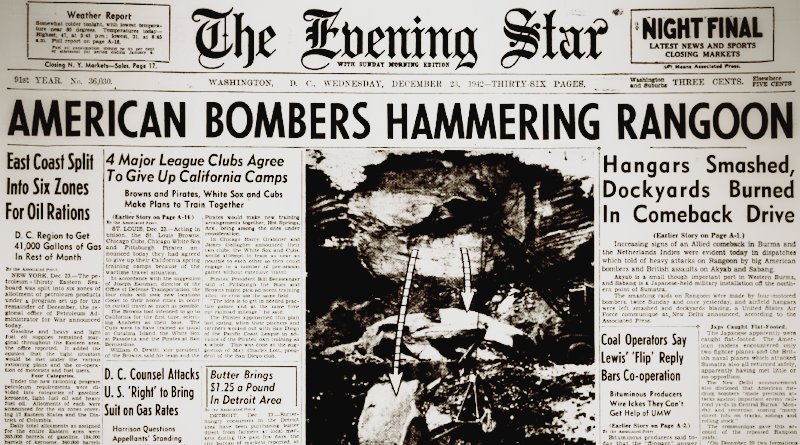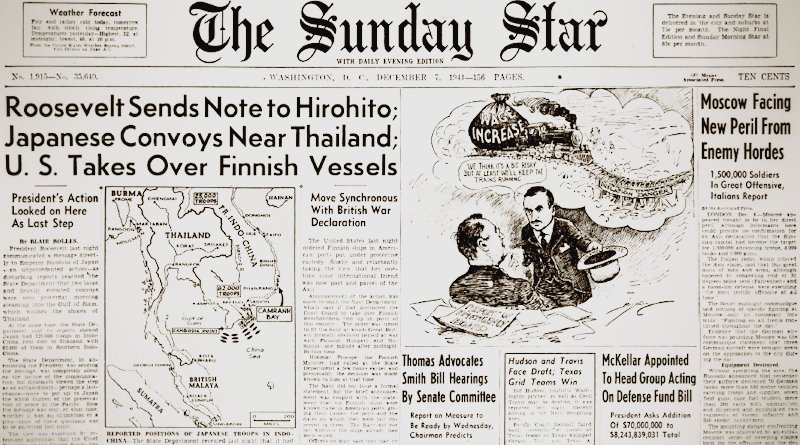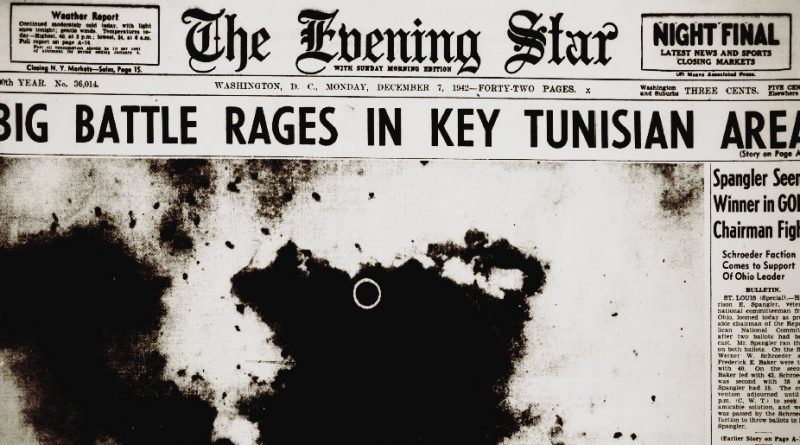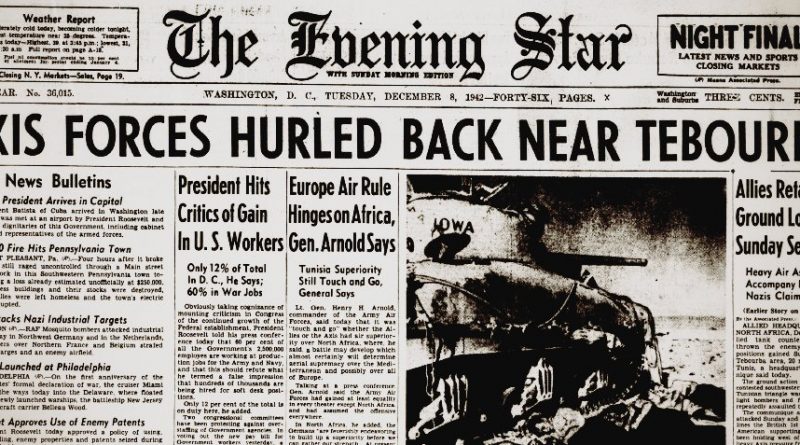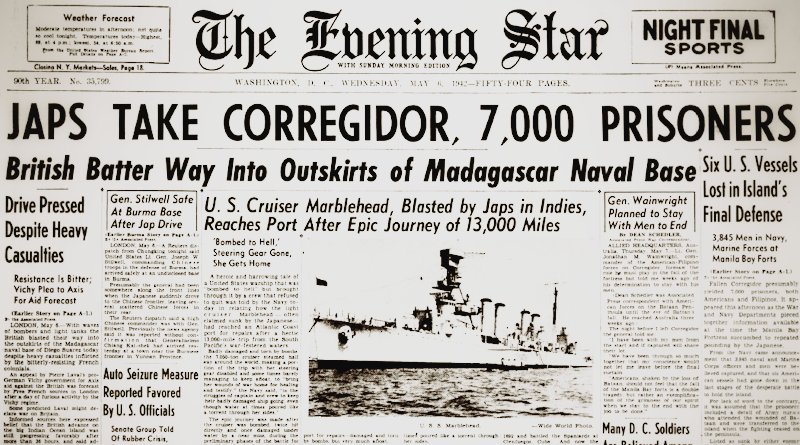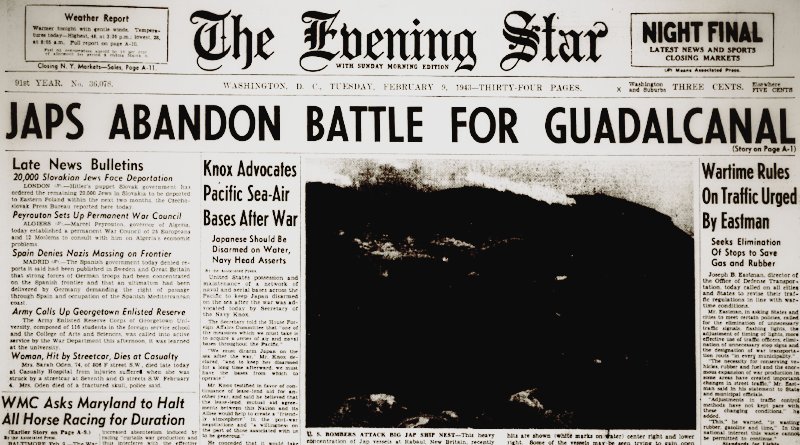World War II Chronicle: December 23, 1942
Click here for TODAY’S NEWSPAPER
Pages B5 and B6 were not digitized… Former Army All-American back Red Cagle died as a result of a fall down the New York subway stairs (see front page)… Former Navy football star “Bullet Lou” Kirn is mentioned on page seven. Kirn earned the Navy Cross earlier this year in the Solomons… Sports section begins on page 16…
Maj. Frank Scheil Jr., last of the American Volunteer Group pilots still flying in China, was killed in a crash during another of his dangerous reconnaissance flights over Japanese territory (see page 18). Scheil scored at least seven victories as a Flying Tiger…
Roving Reporter by Ernie Pyle
WITH THE AMERICAN FORCES IN ALGERIA — During the first part of our England-Africa convoy trip, while the weather was still cold, most people stuck to their cabins, with only a short curiosity foray on deck every couple of hours to see if they were missing anything.
Personally I stayed in bed with my cold most of the first five days, and caught up a little on my reading. I read “Delilah,” by Marcus Goodrich — the story of a destroyer; “A Passage to India,” by E.M. Forster; “Brave New World,” by Aldous Huxley; and an Oxford University booklet on North Africa, which I’d bought in London (I’m one of those guys who always know where they’re going).
A couple in our party had bought French instruction books. Three of the boys already spoke good French. So for the first few days we’d have communal French lessons. But the ones who could speak French were bored with it, and the ones who couldn’t soon got discouraged, so our French classes petered out.
Then we took to card playing. Since gin rummy is the only game I know how to play outside solitaire, that’s what we played mostly. We played for a tenth of a cent a game, so about the most you could ever lose was 30 cents.
The sea was fairly rough the first couple of days, and there was considerable seasickness. Especially below, among the troops. But they handled themselves well, and the holds didn’t get into the frightful condition they do on some voyages.
After a while the sea calmed, and it was in the main a happy voyage. The soldiers were routed out at 6:30 a.m., and at 10 every day they had to stand muster and have boat drill for an hour.
Outside of that they had little to do, and passed the time just standing around on deck, or lying down below reading, or playing cards. There wasn’t any saluting on board during the whole trip. Lots of the soldiers started growing beards.The trip had no sooner started than rehearsals for an enlisted men’s variety show began. I believe you could take any 1,000 soldiers in our Army, and out of them created a good orchestra. From our troops they dug up an accordionist, saxophonist, trumpeter, violinist, two banjo players, a dancer, a tenor, a cowboy singer and several pianists — all professionals.
They rehearsed every afternoon. The big night came a couple of nights before we got to Gibraltar. They put on two shows that night, for the enlisted men only. It was a burlesque, and I mean burlesque. Word got around, and the officers and nurses wanted to see it.
So the night we were approaching Gibraltar they put it on again. They cleaned it up some, by the colonel’s request, but it still sparkled.
The show went over terrifically. There was genuine talent in it, and serious music, as well as the whiz-bang stuff. But the hero of the evening was a hairy corporal — Joe Comita of Brooklyn — who did a strip-tease burlesque of Gipsy Rose Lee.
His movements were pure genius. Gipsy herself couldn’t have been more sensuous. Joe twirled and stripped, twirled and stripped.
And when he was down to his long heavy G.I. underwear he swung to the front of the stage, lifted his veil, and kissed a front-row colonel on top of his bald head!The whole show was marvelously good. But there was something more to it than just that. There was the knowledge, deep down in everybody’s mind, that this was our night of danger.
The radio had just brought word that Germany’s entire U-boat pack was concentrated in the approaches to Gibraltar. More than 50 submarines were said to be waiting for us. I doubt there was a soul on board who expected the night to pass without an attack.
It was a perfect night for romance or for death. The air was warm and the moon put its brilliant sheen across the water. The night by its very gentleness seemed in evil collusion with the plague that lay beneath the waters.
And in that environment the boys from down below went buoyantly through their performances. We sat with life preservers on and water canteens at our belts. We laughed and cheered against a background of semi-conscious listening for other sounds.
As the show ended a major whom I did not know turned to me and said, “That’s wonderful, those boys doing that when they’re being taken to war like galley slaves down there in the hold. When you think of people at home squawking their heads off because they can only have 20 gallons of gasoline, it makes my blood boil.”
Evening star. (Washington, D.C.), 23 December 1942. Chronicling America: Historic American Newspapers. Lib. of Congress.
https://chroniclingamerica.loc.gov/lccn/sn83045462/1942-12-23/ed-1/
